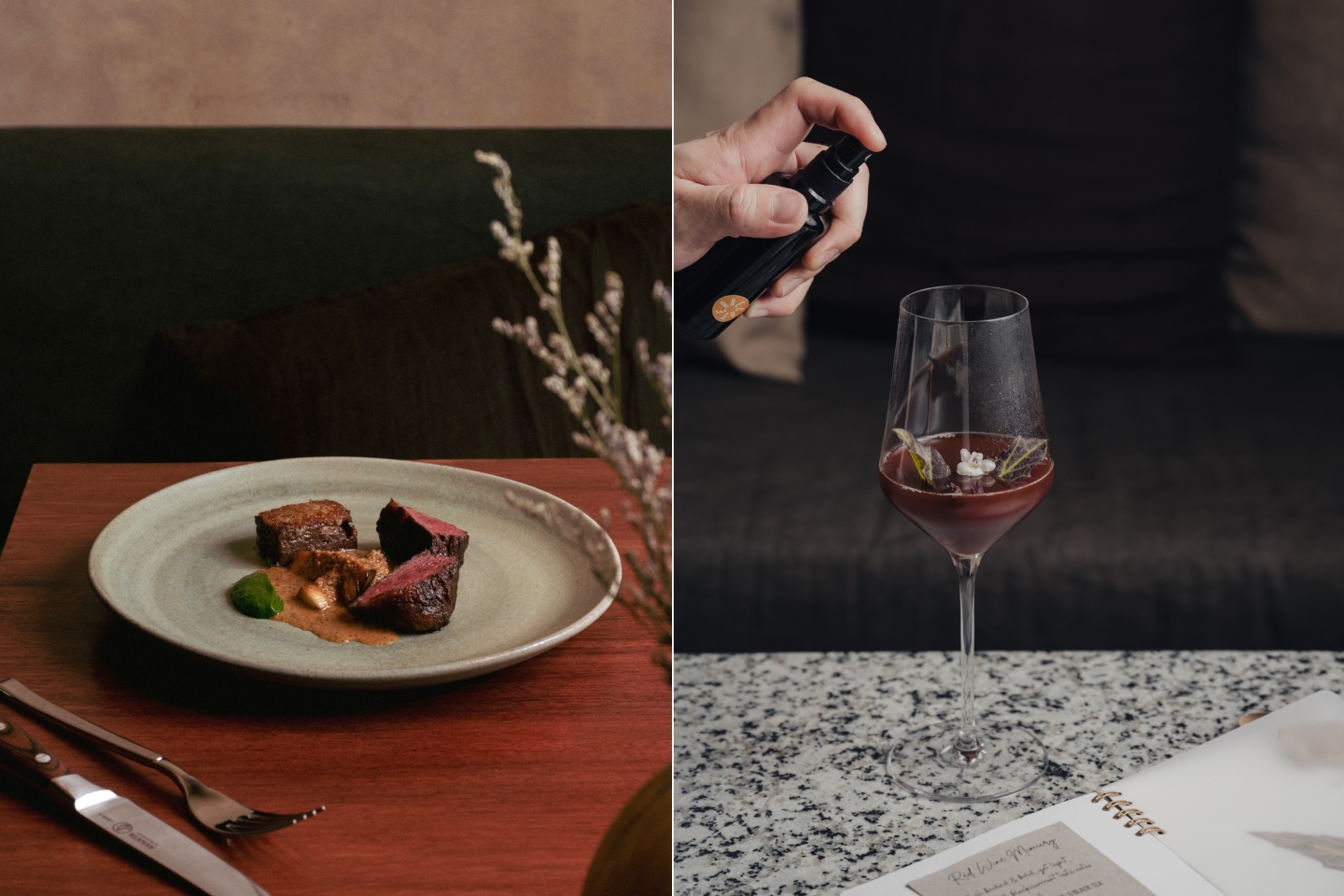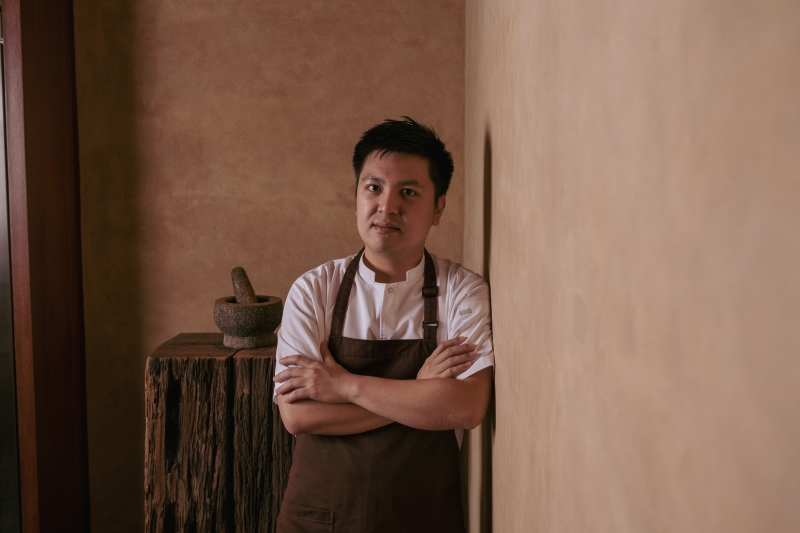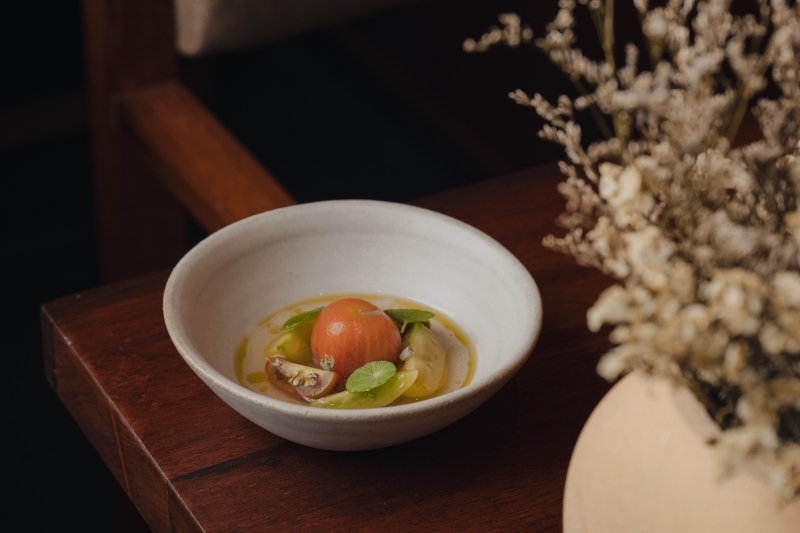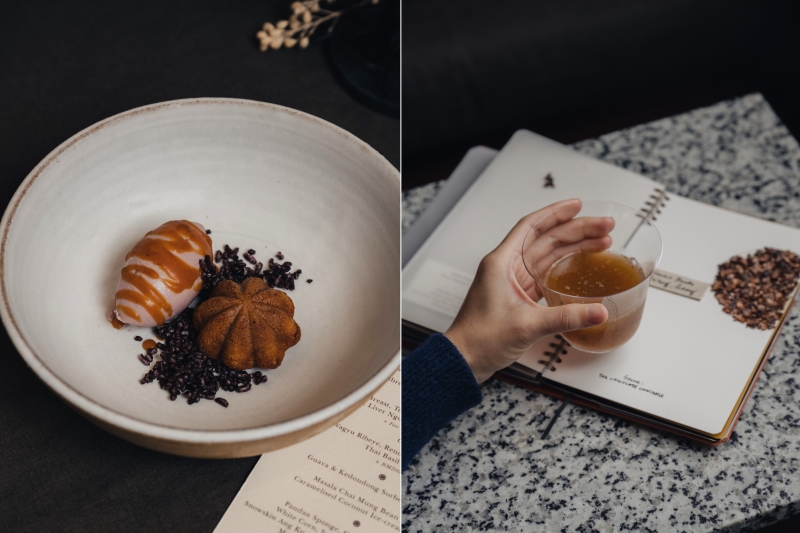
Australian wagyu with a Tuxedo No 5 Black Tea cold brew (All photos: Terra Dining)
There are two terms that recently had the food and beverage industry in a chokehold — “produce-focused” and “zero-proof”. While these concepts are all the rage right now, it is not often that the twain meet, especially not on the grounds of fine dining. After all, that realm has been and without doubt will continue to be dominated by wine. That is not to say carving out a space for innovative and alternative experiences should not be done.
“Diners who might not be very adventurous with alcohol or don’t consume it for whatever reason should be able to have an experience that matches or even surpasses a wine pairing,” says chef/owner Chong Yu Cheng of Terra Dining in Taman Tun Dr Ismail, Kuala Lumpur. “I started in the industry because of wine but I’m aware it can be inaccessible and archaic. Fine dining itself is already intimidating and there is the preconceived notion that it’s a very uptight environment. So to add the layer of wine on top of that makes it even more daunting.”
This wish to mesh approachability and sumptuousness, which mirrors Terra’s overall intention to serve up refined gastronomic offerings in a homely, earthy space, culminates in the new Zero-Proof Botanical Pairing. Created in collaboration with Beca Tea, the degustation matches the restaurant’s existing Malaysian-inspired courses with specially crafted teas and tisanes that highlight fruit and flora from China and Southeast Asia.
chef_yc_1.jpg

The menu kicks off with a snifter glass of a baby pink aperitif combining white ginger flower with rambutan in a chrysanthemum infusion. Tiny beads of coriander oil are dropped into the tea for a herbaceous green note. And with thirst quenched, the meal proper begins with a trio of canapés meant to represent Peranakan, Chinese and Indian culinary influences.
First, the Eastern European way of enjoying caviar on blini, a type of Russian pancake, gets a local twist with eel serunding (a condiment traditionally made with shredded meat or fish, coconut and spices) and salty Amur caviar. Next, Chong reimagines the dim sum classic lo mai gai in a coin of fried mochi and an ultra-umami mix of shiitake mushroom, tofu and “duckkwa” — a rendition of meat jerky created with duck instead of the usual pork or beef. Last but not least, a crispy poppadom shell filled with a salted egg mung bean curry, onion jam and cauliflower is a textural delight guaranteed to set the mood for the night.
For the first entrée, the menu pays tribute to what is perhaps one of the most misunderstood yet common fruits — the tomato. In a ceramic bowl, yellow and red heirloom tomatoes, cultivated in Cameron Highlands, Pahang, sit in a pool of tomato water. Served cold, clear and with bubbles of chartreuse rasam oil on top, the liquid’s appearance is deceptively mild, only to surprise the palate with layers of sour, savoury and slightly salty flavour profiles.
2._heirloom_tomato_tomato_water_rasam_oil_1.jpg

The second pairing of the night comes in the form of slipper lobster in an asam laksa bisque with Tahai oil and a glass of Amber No 4 Oolong cold brew with key notes of daun kesum (Vietnamese mint), tangy passion fruit and pineapple. Several key ingredients traditionally used to make the spicy-sour fish broth are found not in the soup but the tea, encouraging one to go back and forth between dish and drink to experience how the lingering flavours from each mouthful influence the next bite.
Following that is a mystery fish in a rich masak lemak beurre blanc sauce, pandan and chayote leaves, paired with a potion of Passiflora Henryi Hemsl bark from Yunnan, China, juicy mangosteen and tart bilimbi in a base of Goddess No 2 Tieguanyin cold brew. The enigmatic fish, which will be left unnamed here so as not to spoil the fun, makes this course a particular favourite of Chong’s. “This fish for me was something I personally had written off, and it goes to show even things with a relatively bad reputation can have a redemptive arc,” he says, adding that the look of surprise on guests’ faces upon revealing the correct answer brings him much satisfaction.
After an intermission of naan-inspired flatbread made with a tangy sourdough starter and asam pedas butter, the main course is served. Pureblood wagyu from Australia is propped up on grilled mushrooms alongside a square of melt-in-your-mouth beef cheek rendang that has been fried in tallow on one side to produce a crackly, golden crust. A Thai basil palak offers just a smidge of freshness to cut through the protein. To pair, a glass cradling a sprig of sambung nyawa batik (a sort of edible vine also known as “longevity greens” native to China and Southeast Asia) is filled with a Tuxedo No 5 Black Tea cold brew. Boasting a sweetness, earthy complexity and deep burgundy colour from mulberries, the beverage holds its own, removing any craving for its alcoholic lookalike.
Alternatively, the duck breast with Teochew duck braise jus, duck liver ngo hiang (aka lor bak, or meat filling wrapped in beancurd skin) and charred spring onions is sure to please diners who do not consume beef.
To postpone the inevitable food coma and reawaken the senses in time for dessert, a refreshing palate cleanser is next on the agenda. Terra does the job with a guava and kedondong (sand pear or sha li in Cantonese) sorbet, sprinkled with sour plum powder, that evokes memories of sipping on ice-cold juice to beat the heat on those extra humid summer days.
terra_dining_3.jpg

To round out the night, kuih bahulu, crunchy on the outside and spongy on the inside, is plated with a quenelle of beras rumie ice cream drizzled with an eyebrow-raising cencaluk infused caramel that starts off sweet before revealing its salty, shrimpy nuances. As bizarre as it may sound, do not knock it before you try it — you will likely be won over by the time you scrape up that final spoonful. To go with it: a viscous cacao husk infused coconut water with fig and a dash of nutmeg. Much like the caramel, the liquid transforms on the tongue, opening with lightness of coconut before leaving a chocolatey aftertaste.
From start to finish, Chong and team’s attention to detail and the prominence of local ingredients is resoundingly clear. Even the petit fours, which many chefs easily turn into an afterthought after an intricate multicourse meal, were purposefully thought out and executed (the white corn, century egg and custard on a Sablé Breton cookie is a must-have). However, the evident Malaysian influences on both the food and teas ground the menu in humble, nostalgic beginnings that urge diners to end the meal with a heightened appreciation for the fruits of our land and the heritage that surrounds each ingredient.
“I think what we’re trying to do at Terra is give people familiar flavours. We’re not trying to completely turn Malaysian cuisine on its head while sending out things that have absolutely no cultural reference point,” says Chong. “ It’s not to say things like, ‘Oh, you can’t change your grandmother’s recipe’ — I completely disagree with that — but within tradition, there is still a lot of room to grow and refresh. That’s what I’m looking to do, to make diners proud of the things they’ve been eating since young and maybe have been taking for granted.”
91, Jln Aminuddin Baki, TTDI, KL. Wed-Sun, 6-11pm. For reservations, WhatsApp 012 7072 7777.
This article first appeared on Jul 22, 2024 in The Edge Malaysia.


